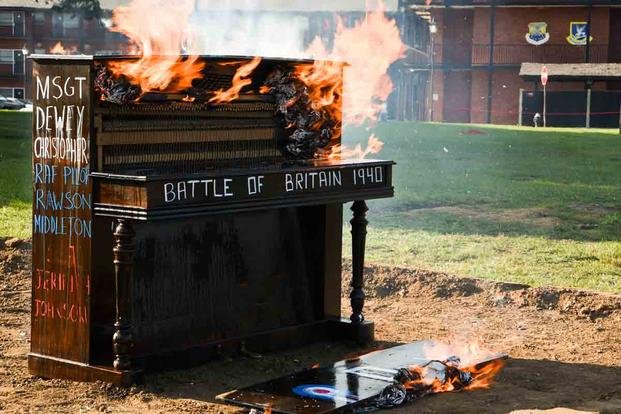
It’s one of the strangest ways to remember those who made the ultimate sacrifice.
Every fall, members of Britain’s Royal Air Force ritualistically burn an upright wooden piano.
“Piano fires” commemorate the RAF pilots (along with pilots who came from other Allied nations) who gave their lives to help win the Battle of Britain between July and October 1940. Nazi Germany’s Luftwaffe, which was superior in numbers and technology, had been tasked with obliterating the fledgling British air corps. Incessant bombing would follow, capped off by a triumphant invasion of England.
Things didn’t go as the Germans planned, however.
Somehow the RAF held its own. They repeatedly fought off Luftwaffe assaults. During the following winter and spring, Germany opted for the Blitz – bombing runs over England, night after night. But London and dozens of other communities endured. Hitler and his forces never attempted the invasion. Prime Minister Winston Churchill said concerning the more than 1,500 RAF and Allied pilots who lost their lives during the fighting, “Never was so much owed by so many to so few.”
No one is quite sure how flaming pianos entered the picture.
Military historian Blake Stillwell links the tradition to an RAF unit who were entertained nightly by a flyer who was an exceptionally gifted pianist. One day his plane didn’t return. “The pilots, knowing the piano never again would play the music they loved so dearly – and that their comrade never would be replaced – burned it.”
The ritual is undoubtedly strange.
But then, what Christians have been doing for a long time concerning those who preceded them in death is pretty strange, too.
Most people feel inherently uneasy about cemeteries. There’s a reason that creepy, fog-enshrouded burial grounds are regularly featured during the annual October run-up to Halloween. Who wants to be in close proximity to dead bodies and thus be reminded of one’s own mortality?
Christians do.
For centuries, church members have been buried within a few steps of the church doors. It’s not unusual to look down at the floor of a European chapel or cathedral and see names and dates etched there. That’s because previous generations are sometimes buried directly below the sanctuary. The dead are lying where the living continue to worship God.
This ancient tradition has largely been displaced during our own time by designated public burial grounds, not to mention the option to spread the cremains of loved ones to the winds.
Years ago, when I had the opportunity to help plant a new church, I stood before my local denominational assembly seeking permission to purchase several acres of ground where the new building would go up. I’ll never forget the older pastor who raised his hand and asked, “Will there be enough room for a cemetery?” Before I could think of anything to say, one of the denominational leaders stepped to the microphone and said, “We’ve been assured there will definitely be enough room to bury Glenn.”
There are two reasons that churches and cemeteries have historically been close together.
The first is that Christians have a compelling reason not to be afraid of death. Jesus died. Then he rose from the dead. The New Testament assures Jesus’ followers that resurrection awaits them, too.
That’s why we can walk amongst gravestones and not shiver.
The second reason is that those who have died “in Christ” are still very much with us. No, there’s nothing in Scripture to support the notion of ghosts. But previous generations are now part of what one Bible author calls the “great cloud of witnesses” (Hebrews 12:1). Think of those who have loved you cheering you on from the balcony, rooting for you to keep your spiritual promises and stay the course.
This is not to say that those in heaven have a “window” on our world and are somehow interacting with present events. But in a way we cannot fully comprehend, there is a unity in God’s family that death and time cannot destroy.
Most of us are more likely to burn candles than pianos when we think of those who have gone before us.
But here’s the crucial difference:
Rather than just grieving those who have been lost, we can also look forward to standing with them again at the Great Reunion.
